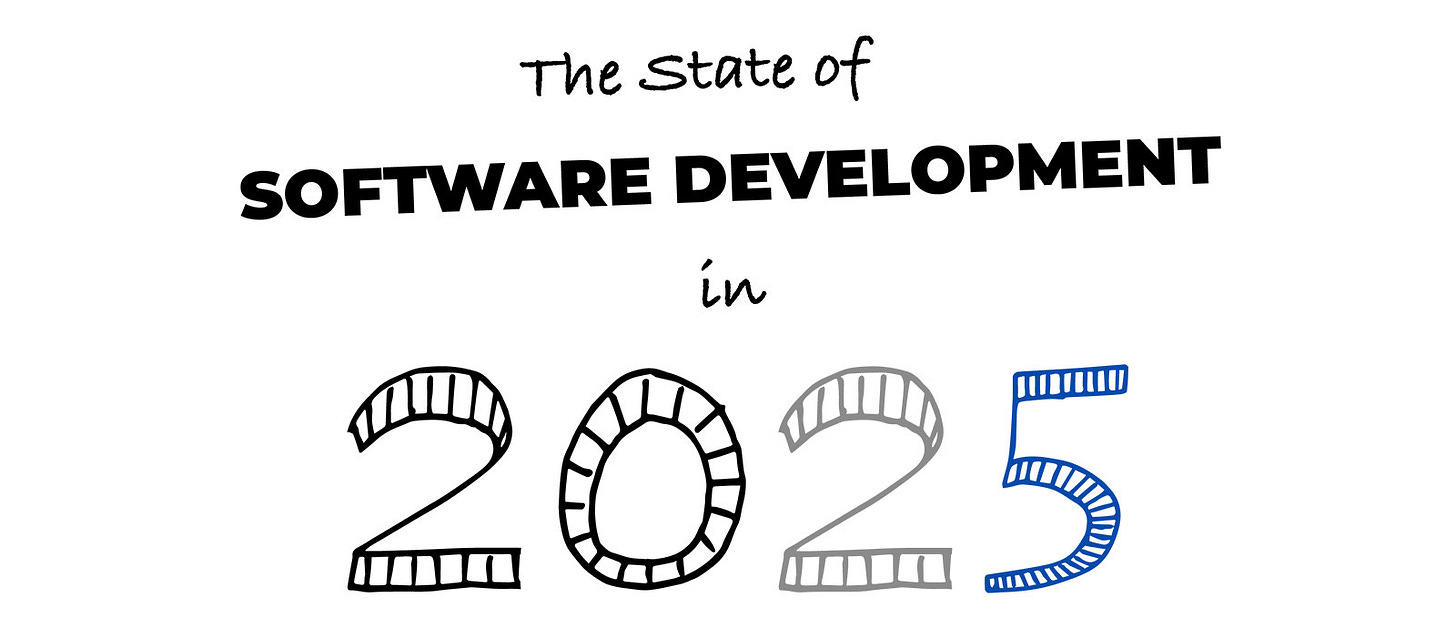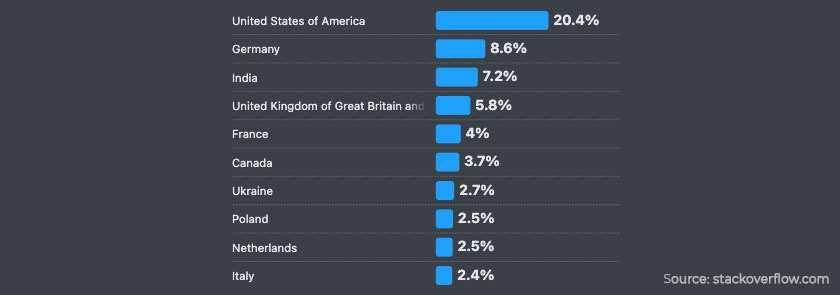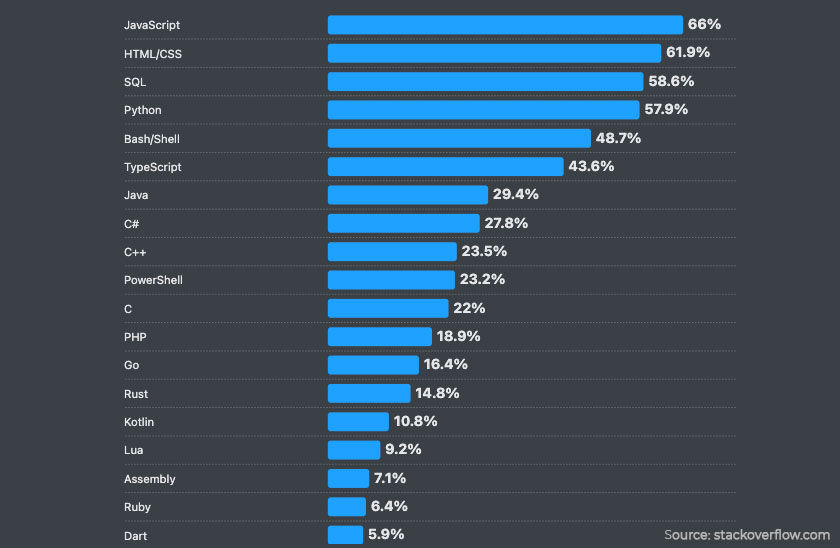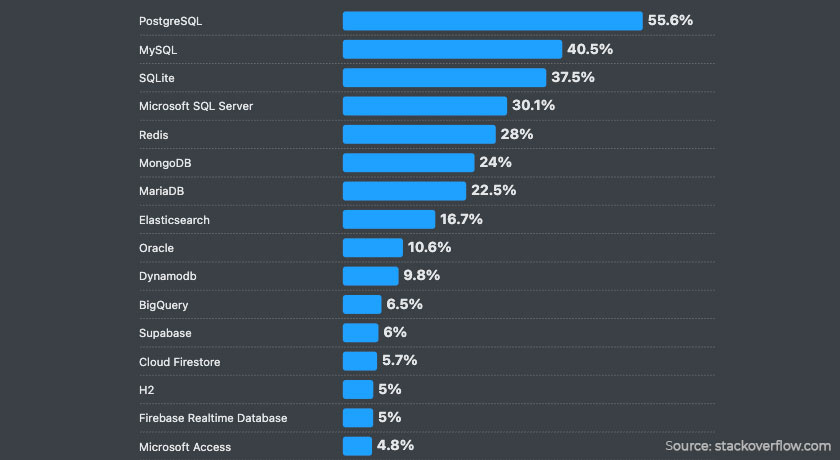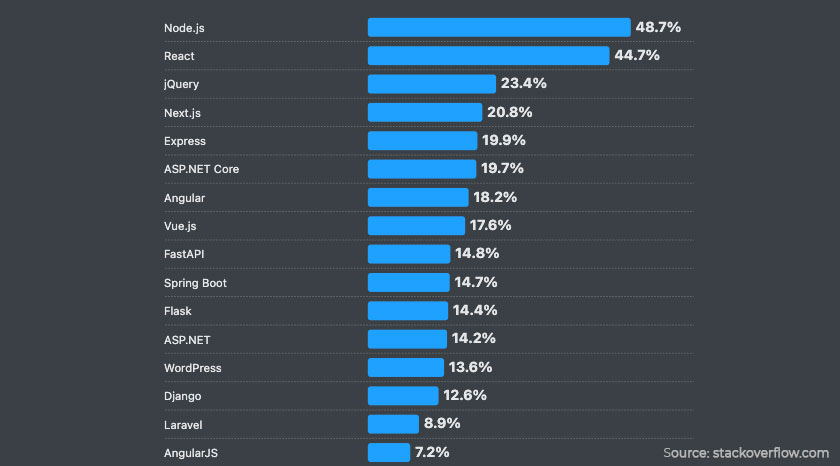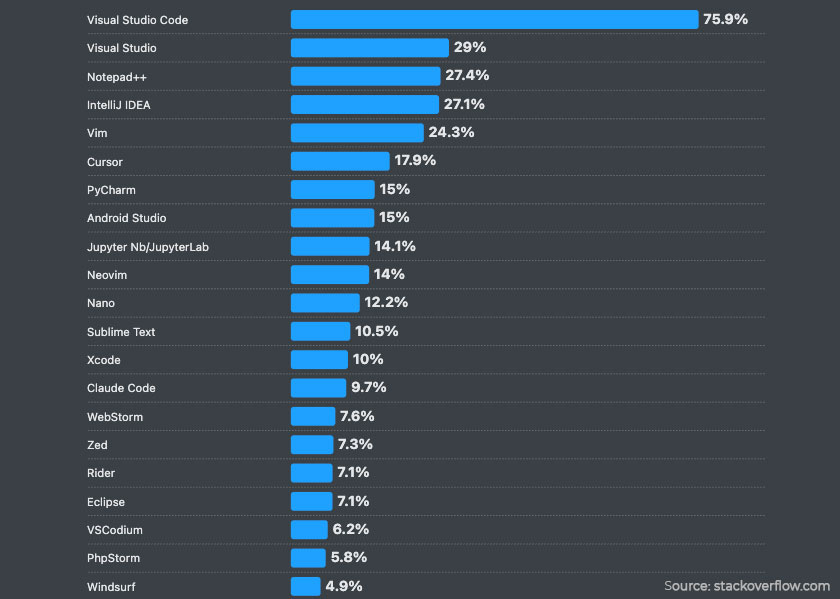The State of Software Development in 2025
49k+ engineers have shared their preferred technologies, how they use AI, work environment and many more interesting things!
Intro
84% of engineers use or plan to use AI tools (up from 76% in 2024).
This has been an interesting insight from the Stack Overflow 2025 Developer Survey that I have closely looked at.
Some other interesting insights:
Trust in AI accuracy worsened -> 46% of engineers now distrust AI outputs (versus 31% in 2024)
Experienced engineers are the most skeptical -> only ~2.5% highly trust AI, and 20.7% highly distrust it (versus 8.3% in 2024)
AI-generated code lacks context or project-specific nuance → 45% of engineers reported that (versus 39% in 2024)
I have reviewed both the 2024 and 2025 Stack Overflow Developer Surveys in detail, and I am sharing my thoughts on the most interesting parts in this article.
Let’s get straight into it.
Over 49k respondents from 177 countries
The first interesting insight was the deviation from the number of people responding to the survey in 2024 vs 2025.
In 2024, there were 65k+ and in 2025, 49k+, which is interesting, because we have been speculating a decrease in usage of Stack Overflow for a while and this is another sign that it’s the case.
I posted this post on Friday and I am curious how many people are actually still using Stack Overflow. I personally hardly used it this year. If you do, make sure to let me know in the comments.
1. Profile of Respondents
1.1 Coding
76% are professional engineers, while 15% are adjacent or upcoming engineers. This is important info, so we know how we can interpret the results of the survey.
1.2 Country
No surprise here, the United States being the most prominent, it also went up by 1.5% from 2024, while the UK, France and Germany decreased a bit.
1.3 Age
60% of engineers are between the ages of 25 and 44. And also interesting insight is the decrease in 18-24 by 3~% and increase of 55-65 by 1.3% (from 2024 to 2025).
My gut feeling is that engineers in the age group of 18-24 don’t use Stack Overflow as much anymore and are primarily using AI when they are stuck.
1.4 Education
The interesting insight is an increase (from 2024 to 2025) of Bachelor’s degrees by 1.1% and also 0.6% of Master’s degrees. Seems like finishing traditional education is still growing, but I’ll be curious to see if that’s going to be the case in upcoming years, or we’ll see more self-taught engineers.
1.5 Industry
Software Development being prevalent (no surprise) and then Internet, Telecomm + it’s great to see Fintech high up there as well.
You can check the full profile of the respondents here.
2. Technology
1.1 Programming, scripting, and markup languages
The most interesting is the increase of Python (up by 7% from 2024) and yes, no doubt the reason is the increase of popularity of AI, as Python is the go-to for that and also for Data Science, Data Engineering and a lot of people use it as a go-to for Backend development as well.
SQL is continuing to gain popularity (increasing 7.5% from 2024). And of course, JavaScript, together with TypeScript, are very popular languages.
So, based on this data and also in my opinion, the most leveraged programming languages to learn in 2025 are JavaScript/TypeScript for frontend development and then Python for backend/AI, ML/Data related and of course, SQL is an all-around important language to learn.
Full data available here.
With that, you have a great all-around knowledge that you can use in so many different situations.
Honorable mentions are Rust (up by 2% from 2024) and Go (up by 3%) gaining more traction, PHP gaining a bit more traction, surprisingly (up by 0.7% from 2024) and Bash/Shell (up by 15% from 2024) and PowerShell (up by 10% from 2024) are all gaining a lot more importance.
I believe such a big upside for Bash/Shell is an increase in demand for automation.
On the downside, Java is down by 1%, which I believe is just because Python is becoming more popular and then Kotlin is down by 1% and that’s in my opinion because cross-platform development is gaining more traction over the years.
1.2 Databases
No surprise that PostgreSQL is up by 7% from 2024 and is the most popular database to use. You can use it in combination with so many things. And yes, that would be my recommendation if you don’t know which particular DB to pick to learn.
Also, Redis is increasingly becoming more and more popular (up by 8% from 2024), which is also not a surprise to me as it’s very easy to use and it can provide a lot of performance upside quickly.
Full data available here.
The interesting data is the increase of Supabase by 2% from 2024 and yes, it’s what most vibe coding tools pick as a default database. Some also offer the integration with it before you start/scaffold your project.
1.3 Web frameworks and technologies
Node.js (up 8%) and React (up 5%) are continuously gaining popularity, which is no surprise; both are a good combination for a web app and you can use JS/TS for both.
Interesting is the increase of jQuery by 2% and it's amazing how popular it still is. I’ve used it substantially for building websites and I can see how it still helps if you don’t wish to use a full-blown framework and just want to do some DOM manipulations.
It’s a lot easier than doing it with plain JS (less typing) → $("#element"), whereas with plain JS, you need to do document.getElementById("element").
Full data available here.
And then FastAPI is up by 5% from 2024, which definitely makes sense as Python is gaining traction. FastAPI has now also become the most popular Python framework, followed by Flask.
What amuses me from the results is also the increase of AngularJS by 0.4%, which is ironic as Angular 2 (now Angular) was released in 2016 and even though it’s been out for 9 years, AngularJS is still used by a lot of companies.
AngularJS is no longer supported as of January 2022, therefore, there are no new releases and no new security patches. Which tells me that if you are an Angular dev, you may find a good niche to be good at migrating AngularJS apps to Angular (I know it’s hard though → from personal experience :))
1.4 Dev IDEs
Visual Studio Code usage is up by 2% and is the most popular IDE by far. The increase is a surprise to me as I have personally switched to Cursor and I know a lot of devs doing that as well.
Also, a very interesting insight is that Notepad++ is quite popular with 27.1%, which is quite interesting as I personally don’t know anyone using it for coding :)
Full data available here.
We can see the rise of Cursor, Claude Code and also Windsurf is in the mix as well. I am assuming that in 2026 the percentage is going to increase in all 3 of them. We’ll see about VS Code → I am curious to see the results in 2026.


